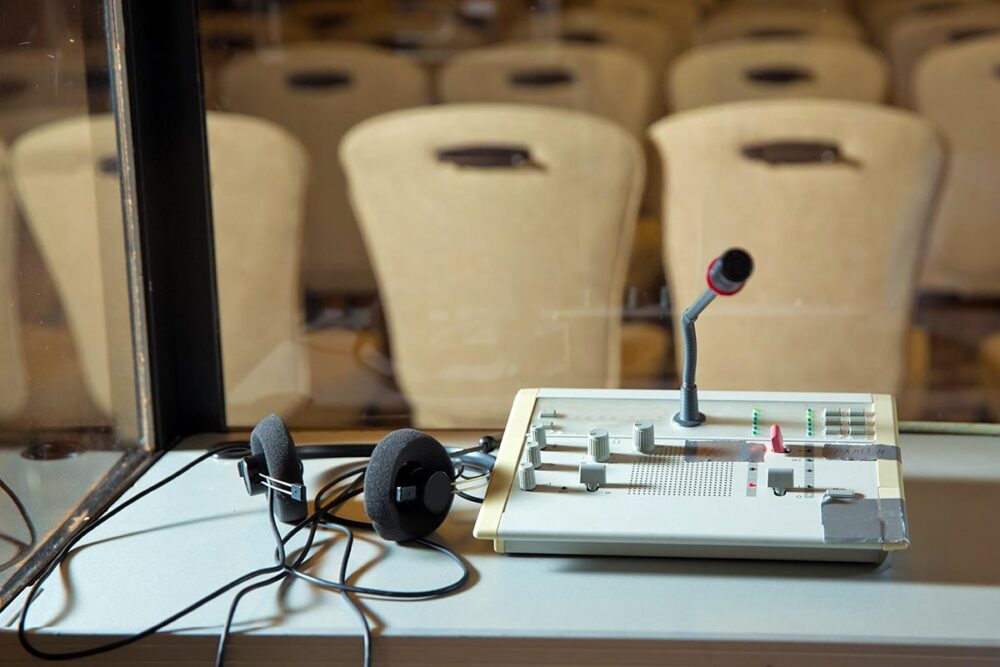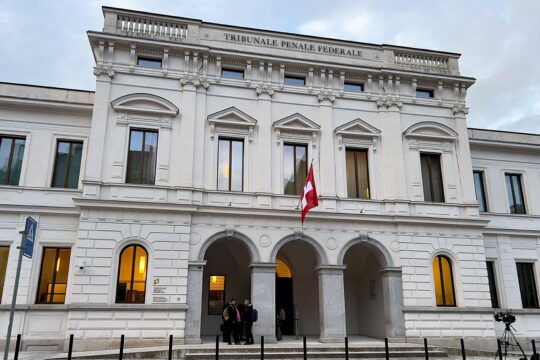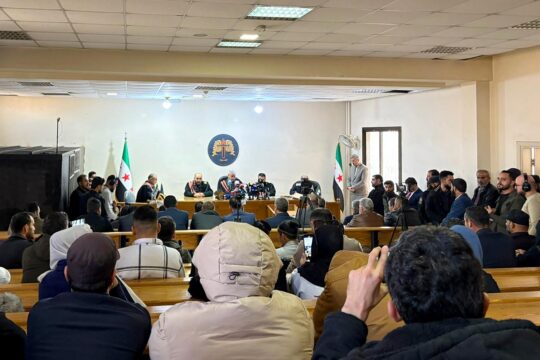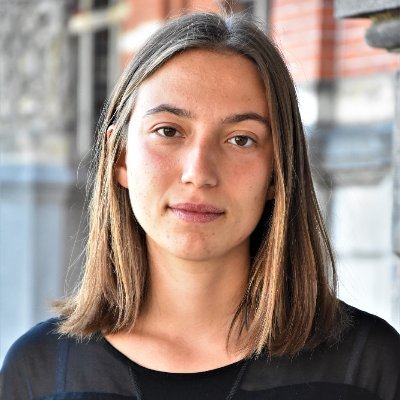A number of European courts have talked about it, only the Netherlands did it. Before the Hague District Court, journalists and members of the Syrian community followed the two hearing days and the judgement in person, with headsets and live interpretation from Dutch to Arabic and vice versa. For those living abroad or fearing for their safety, a personalized web-link to the live-stream and interpretation was created.
This makes the case of Syrian man Mustafa A. unique in Europe. “A lot of these Universal Jurisdiction cases are not very visible” says Hope Rikkelman, Director of The Nuhanovic Foundation, which supported Syrian victims in the Dutch case. She thinks that this first Dutch trial can build a trustworthy relationship between the Syrian community in exile and the Dutch Public Prosecutors. “Accessibility and visibility” are essential to that, says Rikkelman.
The 35-year old Mustafa A. was sentenced to 12 years in prison for crimes against humanity, war crimes, as a former member of the Liwa al Quds', a pro-Syrian government Palestinian brigade that operates in Syria. Judges ruled on 22 January, 2024 that he was involved in the arrest of a man in 2012 in Syria, later handed over to Syrian Air Force intelligence officials who ran a prison where he was tortured.
In the last couple of years, European jurisdictions have carried out an increasing number of investigations and trials under the principle of universal jurisdiction. This principle allows countries to try perpetrators regardless of their nationality and where the crimes were committed. Crimes include war crimes, crimes against humanity and genocide. But courts have also been facing criticism, as many see a gap between the proceedings and the affected population. One barrier is language, as trials are often carried out in the national language and interpretation is offered only to plaintiffs and defendants but not the public.
There is the need to “understand that the whole concept of access to justice is not just about getting justice itself but it is about making sure that victims and communities were able to witness justice being delivered”, says Rikkelman. That includes doing outreach to the communities and providing them with a way to access the trials, she adds.
“A very good trend”
The Hague court was “very accommodating”, says Rikkelman. As civil parties to the case, the Nuhanovic Foundation and the Syrian Center for Media and Freedom of Expression (SCM) asked the court to provide interpretation and online access and they later helped with safe in-person and online registrations, “that is a very good trend that we're seeing”.
Joris van Egmond, press officer at The Hague District Court, explains that “there is no set policy for doing this, it really depends on the individual case”. In the trial for Mustafa A., they did it because “there were people in the audience and among the victims who did not speak the Dutch language well”.
Rikkelman says that from their side, they counted around 40 online registrations for the online simultaneous interpretation and many Syrians also reported what was happening in court to their Facebook groups of their communities. Syrian and international news outlets could also report on the trial. The Nuhanovic Foundation, she says, received “a lot of enthusiastic remarks” from Syrians living in exile. “They were happy that first of all this trial was done and secondly that they were able to participate”.
Impact on plaintiffs, accused and journalists
There are numerous counter-examples.
Around the same time as the Dutch verdict, the hearings in the case of former Gambian Interior minister Ousman Sonko took place in Switzerland. But with a very different setting. The proceedings were in German, with a court interpreter only translating for the accused and the plaintiffs when the issues were deemed relevant to them by the judges.
Mariam Sankanu is a Gambian investigative journalist with Malagen and a correspondent for Justice Info. Together with a small group of local journalists, she could travel to Switzerland and attend the hearings. “As a Gambian, this was the most fulfilling thing that I have done in my career”. But while she could follow the testimonies, to make sense of what was discussed between the lawyers and the judges she had to ask her German colleagues. “There was a lot of support, not from the court itself but from other people there”.
In Bellinzona, civil society organizations had sent a request to the court asking for interpretation and translation into English. One of them is TRIAL International, a Swiss NGO fighting impunity for international crimes. The court declined the request saying that the procedural language foreseen in the law is German, explains Vony Rambolamanana, senior legal advisor at TRIAL.
The court said it would only translate what was essentially important for the parties to understand. This did not include preliminary questions and procedural issues, explains Rambolamanana. Although according to her, these issues and the closing arguments, that she also expects will be in German, are very important to the plaintiffs and the accused.
On another recent Swiss trial, the accused, the Belarusian man Yury Garavsky only received translation when he testified, the plaintiffs were not called to the bench and no translation was provided to them, Rambolamanana says. Then the acquittal verdict was made accessible in Belarusian but not its motivation. “This had an impact on the decision of the plaintiffs whether to appeal or not”, she says.
“Closing arguments are so important to the parties”, adds Rambolamanana, “the victims have been travelling from far away. The lawyer is your voice. If you don't understand your voice it is hard to find some closure”. The impact of language barriers extends to the accused and to the possibilities of the journalists to report for the local communities abroad.
Whose justice is it?
In Germany, the trials for Al-Kathib in Koblenz raised widespread criticism. It was the first criminal trial worldwide for torture in Syria and the court denied simultaneous interpretation for observers. The Syrians who attended in the public gallery were unable to follow the proceedings, unless they spoke German. Civil society organizations filed a motion to ask for translation, says Hannah El-Hitami, Egyptian-German journalist who covered the Syrian trials in Germany for Justice Info and other publications. The court responded that the German Code of Criminal Procedure established German as the main language.
“People were just very frustrated,” El-Hitami says. When a higher court ruled that accredited journalists would be entitled to interpretation, the accreditation period was long closed and all the accreditation papers and press releases had been published only in German, making it hard for Middle-East journalists to access the system. “Translation into the relevant languages is absolutely key, it should be a given,” says El-Hitami. “These cases concern the international community as a whole and not just the people from the country where the crimes happened. How can courts claim that and yet make the trial completely inaccessible to people who do not speak German? It is such a contradiction”.
The right to accessible information for victims is entrenched in international soft law instruments and it is included in the 2012 European Union Directive on “Establishing minimum standards on the rights, support and protection of victims of crime”. As part of this right to information, the Directive states that victims have the right to free of charge interpretation and translation. There is however no mention of translation for the public.
A recent reform to the German system has been drafted in response to the criticism. In order to increase the reach of international trials, three measures are being discussed: allowing media representatives to use translations during the trial, producing audio-visual recordings for scientific and historical purposes, and publishing judgement translations. But these changes, if adopted, would still apply on a case by case situation. To the request made during the Al-Khatib trial, the court had replied that public could follow via media reports.
Courts in Europe have an ambition to hold international perpetrators accountable, says Rambolamanana. “But they need to have the means and outreach is not a detail”. In order to respond to concerns of transparency and impartiality, courts need to make sure that the affected population can understand the proceedings. “A Swiss jurisdiction judging on people from the Global South raises concerns. If you do not offer transparency to the population that is also a way to open yourself up to criticism”, says Rambolamanana. Then, “if they do not reach out to the communities, I think there is no deterrent effect”, she also believes.
“The fact that the Netherlands has done it shows that it is possible”, she adds.








